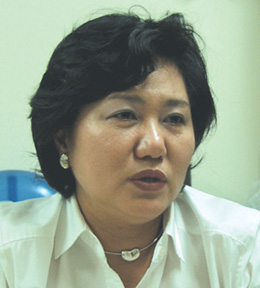
The 2nd International Conference of the Asia-Pacific Society for the Cognitive Science of Music (APSCOM 2005) was a gratifying experience for musicologists who had not previously seen their work acknowledged as science. One of the people who put in time and effort to make it possible was Professor Chang Sun-hee (Music Education, Grad. School of Education). She was appointed chair of APSCOM 2005 in 2001, after the first APSCOM held in Japan. She is also the president of Korean Society for Music Perception and Cognition (KSMPC). In addition to arranging the conference, beginning with fundraising and scheduling, her duties even included looking after foreign scholars' hotel reservations.
Professor Chang faced great difficulty in raising funds for the event. Recalling the chaos, she says, "I was worried about how to proceed with a low budget. Since the value of music in daily life is often neglected, it was hard to convince the sponsors to invest. Thankfully, companies such as Evervill, Korea National Tourism Organization, Yamaha, KSMPC, and Korea Telecom Freetel (KTF) have helped us to make this conference possible."
Technical problems interfered with and delayed many sessions too. "In Western schools, air-conditioning and other electrical supplies come for free, however, at Ewha, we had to pay for what we used. The rules were so complicated that I got confused and that caused some technical difficulties," says she.
Professor Chang, one of the establishers of APSCOM 2005, says that APSCOM is meaningful in itself as it is the first Asian community to discuss the cognitive science of music. Unlike at some conferences where only famous scholars are scheduled for speeches, in APSCOM 2005 students are given chances to present their papers and gain feedback. She has tried to create a family-like mood instead of a heavy academic mood in order to bring about comfortable intellectual change. To achieve this goal, around ten Ewha students from the Graduate School of Education participated in the conference actively and presented their theses. "I am very happy and grateful that the conference went on smoothly. Participants were very satisfied with subjects chosen for the speeches and the sessions, as well as with the works of Ewha students. Actually, the participants were stunned by how professionally we managed everything even though this conference is still in its establishment stage," said Professor Chang.
She says she has often faced confusion in her identity as a musician. "Koreans only focus on performing music, and only try to learn the tricks and techniques. However, music is not just about playing the notes." When she was a student, she wondered what being a musician really meant. Establishing APSCOM was the answer to her identity question, and is also a way of helping students who face the same identity crisis as she once did. "When the musicians' feelings are inserted in the music, it can create different impacts on people's emotions. So, musicians should not just stop and be satisfied with playing the notes properly, but add their own color into the music," says she.
Although the cognitive science of music is not yet a well-known subject area globally, through events like APSCOM 2005 music is making itself another branch of science. "I believe the cognitive science of music will eventually grow into a bigger field and people's perception of music will change," says Professor Chang.

